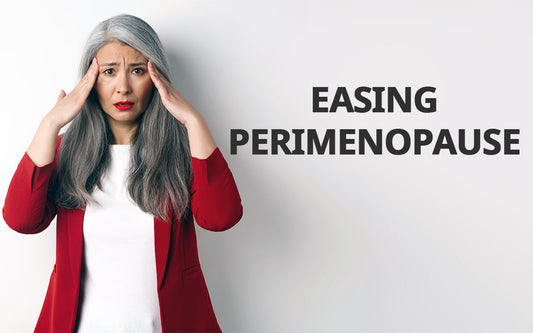Perimenopause can feel like a confusing chapter. It’s the natural transition before menopause when your body starts going through noticeable changes. For some women, it begins in their 40s, but it can happen earlier too. During this phase, hormone levels shift, often causing a mix of emotional and physical changes. You might feel different but not quite sure why.
Mood swings, hot flashes, and changes in your menstrual cycles are just a few signs. The good news? There are ways to help ease these discomforts and support your body during this shift. In this blog, we’ll explore what perimenopause is, common symptoms to look out for, and some dietary supplements that may help you feel more balanced.
What Is Perimenopause?
Perimenopause is the time leading up to menopause, when the ovaries slowly begin making less estrogen. It usually lasts for several years and officially ends when you haven’t had a period for 12 months. Until then, your menstrual cycles may become irregular—shorter, longer, heavier, or lighter than usual.
This hormonal shift doesn’t just affect your periods. It can also influence how you feel mentally and physically. Understanding these changes is the first step toward managing them in a way that fits your lifestyle.
Common Perimenopausal Symptoms
Each woman experiences perimenopause differently, but some signs are more common than others. You may notice:
- Hot flashes and night sweats: Sudden warmth, often with sweating, that can disrupt your day or sleep.
- Mood swings: Feeling irritable, anxious, or sad without a clear reason.
- Vaginal dryness: A common discomfort caused by lower estrogen levels.
- Brain fog or memory lapses: Some women report having trouble focusing or remembering things.
- Sleep issues: Trouble falling or staying asleep.
- Changes in menstrual cycles: Cycle may become irregular or unpredictable.
These symptoms may come and go or stick around for a while. But with a bit of care, there are ways to help manage them naturally.
Why Supplements Can Help During Perimenopause
While a healthy diet and regular exercise are important, some women find that adding dietary supplements helps maintain a sense of balance. These supplements aren’t quick fixes, but when taken consistently, they may support your overall well-being.
Here are some natural options that have been traditionally used to help ease perimenopausal symptoms.
- DIM (Diindolylmethane) – Support for Hormone Balance
DIM is a compound found in cruciferous vegetables like broccoli and cauliflower. It's often used in supplements to help support healthy estrogen metabolism, especially during times when hormone levels are shifting, like perimenopause.
Many women turn to DIM to help maintain a better sense of hormonal balance, which may help with discomforts like mood swings, hot flashes, and changes in menstrual cycles. Since estrogen levels can rise and fall unpredictably during perimenopause, DIM can support how the body processes these changes naturally.
- Ashwagandha – For Mood and Stress Support
Ashwagandha is a traditional herb that has been used for centuries to help the body adapt to stress. During perimenopause, when hormone levels shift and mood swings or sleep troubles become more noticeable, ashwagandha may help support emotional balance.
Some women also find that ashwagandha helps with brain fog and energy dips, which are common during this phase. It’s often included in perimenopause supplements because of its gentle, calming properties that may support both the mind and body.
- Calcium and Vitamin D – For Bone Health
Hormonal changes during perimenopause can affect bone density. Estrogen plays a big role in keeping bones healthy, so as levels shift, it's important to support bone health from the inside out.
Calcium helps maintain bone structure, while vitamin D helps your body absorb it better. Together, they’re a solid foundation for keeping your bones strong during this phase and beyond.
- Omega-3 Fatty Acids – For Mood and Brain Function
Your brain also feels the changes during perimenopause. Mood swings, mental fatigue, and fuzzy thinking are common. Omega-3 fatty acids, especially those found in fish oil, may support mood balance and cognitive functions.
They’re also known for supporting heart and joint wellness, making them a helpful addition to your daily routine.
- Magnesium – For Sleep and Stress Support
Magnesium is a mineral that plays a role in hundreds of body functions. During perimenopause, it can be especially helpful in supporting quality sleep and calming a racing mind.
If stress and sleep issues are part of your experience, magnesium might be worth considering.
Lifestyle Tips to Support Your Body
Supplements can help, but small lifestyle habits can make a big difference too. Here are a few things to keep in mind:
- Stay active: Regular movement helps with mood, sleep, and bone strength.
- Eat a balanced diet: Include whole foods, healthy fats, and lots of fruits and veggies.
- Practice mindfulness: Meditation, journaling, or even a simple walk can help center your thoughts.
- Hydrate well: Drinking enough water supports your skin, energy, and overall comfort.
- Track your symptoms: Keeping a journal can help you notice patterns and better understand your body.
When to Talk to a Healthcare Professional
It’s always a good idea to speak with a healthcare provider when symptoms start to affect your daily life. They can guide you through options that suit your needs and check for any health issues that might be contributing to your discomfort.
Remember, every woman’s perimenopause journey is different. What works for someone else might not be right for you—and that’s completely normal.
Conclusion
Perimenopause is a natural stage in life, but that doesn’t mean you have to feel off-balance the whole way through. With the right mix of knowledge, support, and helpful supplements ahswa, DIM, and omega-3s, you can help your body feel more at ease.
Taking care of yourself now lays a strong foundation for the years ahead. Listen to your body, find what works for you, and know that you’re not alone in this transition.






